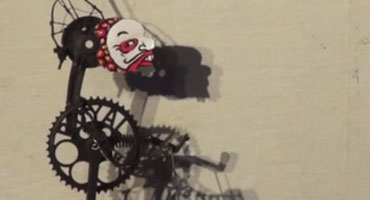
 I agree
I agree
.
Wayang Onthel [Bicycle Wayang] (2012)
Dalang: Andri Topo
How to cite: Andri Topo ([2012] 2016), Wayang Onthel [Bicycle Wayang], translation and notes by Miguel Escobar Varela, Thomas Sembodo and Yosephin Novi Marginingrum. Singapore: Contemporary Wayang Archive. Retrieved from http://cwa-web.org/en/WayangOnthel.
Summary
Paijo inherits the land of the Bike Lovers Academy (Padepokan Suka Pit) after the death of Kiyai Genjot. He is tricked by Pak Darso to take a loan with his property as mortgage. The money diminishes and he loses his friends. Eventually he also loses the land.
Story: Contemporary Situation
Music: Contemporary Gamelan
Space: Gedebog, Modified Screen, Proscenium Stage
Performers: Single Dalang
Puppets: Unconventional Wayang
Language: Javanese
Recording details
Notes: Performed as part of the Pekan Wayang Solo 2012 on 12 June 2012.
Produced by: National University of Singapore
Recording place: Taman Arena, Surakarta
View the metadata record for this resource.
Translation and notes by Miguel Escobar Varela (MEV), Thomas Sembodo (TS) and Yosephin Novi Marginingrum (YNM).
1. The name of the character Gĕnjot also means to cycle YNM.2. The melody of this song corresponds to the well known song "Prau Layar" TS.
3. A joke. The character speaks as if he was on a walkie-talkie TS.
4. He is spelling the word layat [to express condolences] TS.
5. Paijo is drunk and on the phone TS.
6. Témpé is a traditional bean curd made with fermented soya beans MEV.
7. BBM stands for Bahan Bakar Minyak [combustible fuel], but the other character jokingly explains it as Bahan Bakar Mangan [fried food] YNM.
8. It is polite to take leave from someone in Indonesia MEV.
9. Kula nuwun is a phrase used when visiting others and knocking on doors TS.
10. The expression walking-walking mimics the reduplication of jalan-jalan [to walk around] MEV.
11. BPKB stands for Bukti Pemilik Kendaraan Bermotor [driver's licence] and STNK stands for Surat Tanda Nomor Kendaraan [registration proof] MEV.
12. Paijo uses kowé a Low Javanese second person pronoun as an expletive here MEV.
13. The dalang jokes that the puppet looks tall because the control rod is too long MEV.
14. Jatah can refer both to rice and to sex, depending on the context MEV.
15. Gěndruwo is a supernatural being said to be big and tall, covered with black fur, with big red eyes and long fangs TS.
16. Kléyang kabur kanginan[to be carried by the wind] YNM.
17. The song in the background says Adhuh Gusti wĕlasana mring awak mami / Kawula kang tansah anandhang prihatin / Mugya paring pangapura [Oh God, give me your love / Your servant has always faced problems / May You forgive me] YNM.
18. Cěmpala is a wooden mallet used by the dalang to direct the musical accompaniment MEV.
The honorifics in the original languages were retained in the subtitles. In Javanese and Indonesian, speakers address their interlocutors with over 40 different honorifics which denote differences in their relative status and level of intimacy.
ID = Indonesian
JW = Javanese
Adik. ID. Younger brother/sister. It is used for addressing younger people, not necessarily one's relatives.
Adinda. ID. Younger sister. More intimate than adik.
Babé. ID/Betawi. Familiar form of father, commonly used in Jakarta.
Bé. ID/Betawi. Short form of Babé, father. Jakartan slang.
Bang. ID. Older brother, short form of abang. If used with non-relatives, it is has the connotation of a slang, and is somewhat equivalent to “man” in English.
Bĕndara. JW. Master.
Bibi. JW/ID. Aunt. A way of addressing/referring to older women.
Bos. ID/JW. An adaptation of the English "boss". Used either to refer to one's superior or to a friend in a joking context, for example, when a person orders others around without realizing he/she is doing so.
Bu. ID/JW. Short form of ibu, mother.
Bung. ID. Similar to bang, but slightly less formal. It might mean "comrade". The political leaders of the independence war are often referred to with this term, for example Sukarno is often referred to as
Bung Karno.
Dara. JW. Short form of bĕndara, master.
Dèn. JW. Sir, master, used to address royalty. Short form of radèn.
Dhé. JW. Short form of pakdhé, uncle.
Dhik. JW. Short form of adhik. Younger brother/sister. It is used for addressing younger people, not necessarily one's relatives.
Éyang. JW. Grandfather.
Dimas. JW. Younger brother.
Gusti. JW. Lord. Used to address superiors and Gods.
Ibu. JW/ID. Mother. Used generically to address women who are older than the speaker.
Kakang. JW. Older brother.
Kakang mbok. JW. Older sister.
Kanda. ID. Older brother. Formal.
Kang. JW. Older brother. Informal.
Kangmas. JW. Older brother.
Kaki. JW. Uncle
Kang. JW. Older brother, used generically for men older than the speaker. It is a shortened version of kangmas).
Kakak. JW/ID. Older brother/sister, used generically for people who are older than the speaker.
Lé. JW. Son, short version of tholé.
Lik. JW. Often used between friends as a slang term of address. Uncle, "little father." Short form of {paklik}.
Ma. JW. Same as pak, short form of rama.
Mbak. JW/ID. Older sister. Used generically for women who are slightly older than the speaker.
Mamang. ID. Uncle.
Mang. ID. Uncle, short form of mamang.
Mas. ID. Older brother, used generically for men who are older than the speaker. Although it is also a shortened version of the Javanese kangmas people prefer to use mas in Indonesian and kang in Javanese.
Mas bro. ID. Slang used among male friends. In a way, it is a reduplication.
Mbah. JW/ID Grandfather, grandmother. It is used generically to address people who are much older than the speaker. Short form of simbah.
Mbok. JW. Mother, short form of simbok. Used generically for women who are older than the speaker.
Mbokdhé. JW. Aunt. Literally, "big mother".
Mbul. JW. Informal term of address between close male friends.
Ndara. JW. Master.
Nduk. JW. Daughter, short form of gĕndhuk.
Nggèr. JW. Son, short form of anggèr Used generically for people who are younger than the speaker, with whom the speaker is on intimate terms.
Nimas. JW. Younger sister.
Nok. JW. West Javanese term for daughter, short form of dhénok.
Nona. ID. Miss, unmarried woman.
Paduka. ID. Your Excellency.
Pak. JW/ID. Father, used generically for men who are older than the speaker.
Pakdhé. JW. Uncle. Used to refer to a man who is older than one's father.
Paman. ID. Uncle. Used to refer to a man who is older than one's father.
Pangéran. JW/ID. Prince.
Prabu. JW. King.
Radén. JW. Master, used for royalty.
Rama. JW. Father. It can also be used to designate catholic priests when one is speaking in Indonesian.
Simbah. JW/ID Grandfather, grandmother. It is used generically to address people who are much older than the speaker.
Sinuwun. JW. Very formal way to address a man, reserved for sultans, kings and Gods.
Siwa. JW. Term for addressing older people.
Siwak. JW. Same as Siwa. Term for addressing older people.
Tholé. JW. Son
Tuan. ID. In colonial contexts, this is the way foreigners are addressed but it can also mean sir.
Wa Nĕrpati. JW. Uncle king, equivalent to the Indonesian paman raja.
Wa. JW. For addressing older people, short form of siwa.
Yayi. JW. Younger brother/sister.
Yunda. JW. Older sister.
See the Translation conventions.
Share:
in the translations or data.
